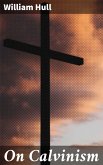John Calvin's 'Institutes of the Christian Religion' is a seminal work of Protestant theology, originally published in 1536. The book explores core Christian doctrines such as the nature of God, salvation, and the church, presenting them in a systematic and rigorous fashion. Calvin's writing style is characterized by its clarity, logical structure, and deep engagement with biblical texts and theological traditions. The 'Institutes' played a significant role in shaping Protestant thought and remains a foundational text in Reformed theology. In addition to its theological insights, the book also reflects Calvin's pastoral concerns and his desire to provide spiritual guidance for believers. Through his meticulous exegesis and theological reflection, Calvin offers readers a profound understanding of key Christian beliefs and their implications for Christian life and practice. John Calvin, a French theologian and pastor, is best known for his role in the Protestant Reformation and his development of Reformed theology. As a prominent figure in 16th-century Protestantism, Calvin's writings continue to be studied and revered by scholars and theologians around the world. His deep theological insights and pastoral wisdom are evident in the 'Institutes,' making it a valuable resource for anyone interested in the history of Christian theology or seeking to deepen their understanding of the Christian faith. I highly recommend 'Institutes of the Christian Religion' to readers who are interested in exploring foundational Christian doctrines and engaging with the theological legacy of the Protestant Reformation.
Dieser Download kann aus rechtlichen Gründen nur mit Rechnungsadresse in A, B, BG, CY, CZ, D, DK, EW, E, FIN, F, GR, H, IRL, I, LT, L, LR, M, NL, PL, P, R, S, SLO, SK ausgeliefert werden.









